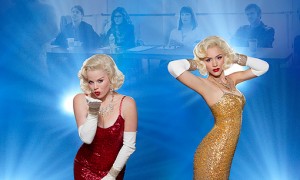 This week is the season finale of Bunheads, an ABC Family confection set in a fantasy California idyll, about the teachers and students at a dance school. I will watch the episode. And I will watch it as I have watched all the prior episodes: with continuously rolled eyes and a simmering irritation that could result in a remote flying at the TV. Why? I’m hate-watching it. Along with a handful of other shows. Yes, I’m watching numerous television shows that I despise. And I’m not the only one. “Hate-watching” is a thing now; just last night my friend and I bonded over the fact that we’re both hate-watching The Newsroom, too. Another friend is hate-watching True Blood. So this is my question: What the fuck is wrong with us?
This week is the season finale of Bunheads, an ABC Family confection set in a fantasy California idyll, about the teachers and students at a dance school. I will watch the episode. And I will watch it as I have watched all the prior episodes: with continuously rolled eyes and a simmering irritation that could result in a remote flying at the TV. Why? I’m hate-watching it. Along with a handful of other shows. Yes, I’m watching numerous television shows that I despise. And I’m not the only one. “Hate-watching” is a thing now; just last night my friend and I bonded over the fact that we’re both hate-watching The Newsroom, too. Another friend is hate-watching True Blood. So this is my question: What the fuck is wrong with us?
There are plenty of shows I’ve stopped watching. Usually, I’ll give a series the pilot and one “benefit of the doubt” episode. Then, unless it’s wildly critically acclaimed (so I feel like I should watch it), or I have friends who insist it’s great, or it has a winning actor to pull me in (I’m looking at you Jake Johnson from The New Girl! *wink*), I’m done. Goodbye, NBC’s Prime Suspect. Similarly, when I just don’t “get” a show, even if I know it’s well done, even if everyone I know likes it—Lost, The Shield and Glee (sorry Gleeks) come to mind—I can pretty easily stop watching. It’s just not for me; moving on.
But for some reason, certain shows exert a weird hold on me, even though I know they’re not good or they just plain annoy the shit out of me. I would love to say I’m watching Bunheads, The Newsroom and (since it’s true confession time) Political Animals because we’re in the TV doldrums of summer; there’s nothing on! The networks are lolling in their lazy summer hammock full of repeats, Canadian imports and cheesy reality shows. But the fact is, I don’t regularly watch much network TV anyway (virtually no dramas) and there are plenty of other good series airing right now, including arguably the Best Show On TV: Breaking Bad. Not to mention, I hate-watch during the “regular” network season too.
So what’s going on here? Why keep watching something that actively pisses you off? I’ve come up with a few possibilities.
Peer Pressure: That friend who’s watching True Blood? She’s been watching it since the first season with a neighbor. They get together every Sunday and make a night of it. This year she’s found the show increasingly ludicrous and infuriating, and has told her friend in no uncertain terms: after this season I’m done with this crazy ass show. But for the time being, she’s trapped in that net of shared pop cultural touchstones and camaraderie and routine that you can get in with friends. (It’s probably why sequels—even shitty ones–do as well as they do: “Come on, we saw the last one…”) When all your friends are watching something, it’s often hard to say no; what the hell else will we talk about on Monday?
Sadly, no one I know watches Bunheads. There goes that theory.
We’re Not Bailers: There was a priceless moment on last season’s 30 Rock when Liz Lemon’s boyfriend Criss accused her of not having the staying power to make a go of their relationship, because she fundamentally “bails” on things. Liz shot back a brilliant, airtight defense: “I’m no bailer! I’m still watching Smash!”

I was still watching Smash too. For the whole freaking season. Despite its beyond annoying characters (particularly the oh-so-punchable Ellis), despite its endless repetition (Karen or Ivy? Ivy or Karen? Karen, Ivy, Ivy, Karen, kill me now), despite its fundamentally low stakes (the studio’s too hot!), despite its unbelievable plot twists (Angelica Houston is dating a bartender 15 years her junior—who’s sexy and rich and…shady!), despite Debra Messing’s unfortunate scarf and flowy sweater collection, I watched every single goddamned episode.
Partly, this was out of sheer shock; I adored the Smash pilot, thought it was the best one of last year’s crop and championed it to everyone I knew. I kept hoping against hope that Smash would live up to that initial promise. Like a woman who keeps seeing a guy because their first date was so great, even though he’s never been that charming or interesting again (I said it was embarrassing confession time!), I stuck with Smash, desperate for it to once again display the utterly delightful mix of human drama, fun backstage shenanigans and full-throated musical joy that it nailed in the pilot. It never happened again—in fact, the show got worse and worse—but I kept desperately hoping it would get better. And in case it did—I wasn’t going to bail and miss it. I was in from the beginning and I was staying.
Now, I started watching Bunheads a third of the way into the season, in its endless cycle of repeats. I caught the second episode part way through and found it utterly baffling; I had to go back and find the pilot on demand so I could figure out what the hell was going on and how in the world the characters were connected. I could have stopped there—it was already starting to piss me off—but I ended up DVRing the whole season. Curious, no?
The Car Wreck Theory: Probably no show currently airing (or currently being hate watched by so many people) is a better example of this than The Newsroom. Aaron Sorkin’s much-maligned soapbox arrived with such a great provenance: Aaron Sorkin unshackled on HBO? What could possibly go wrong? Whether it was A Few Good Men, Sportsnight, The American President, The West Wing or The Social Network, if you’re a consumer of smart entertainment, an Aaron Sorkin production has probably thrilled you to your core. The guy can write. And as a writer—not director–his author’s hand is visible in a way that in mass-market movies and TV is all too rare; you spot Sorkin’s style within moments (that opening flurry of words break-up in The Social Network, anyone?) that when it works is satisfying and like nothing else. When it doesn’t work, sadly, you get The Newsroom. (Or the truly unmentionable Studio 60.)

Suddenly, on this show, everything that’s worked for Sorkin in the past manages to either feel forced or fall flat. Suddenly, his “style” seems like an unfortunate tic. (Cue the brilliant and frightening Sorkinisms—A SuperCut.) The florid, impassioned speeches that were heady and rousing on The West Wing seem self-indulgent and incongruous. The screwball comedy office romances that were fun and engaging on Sportsnight are suddenly preposterous and silly. The pitched tension of diametrically opposed characters that fueled such vivid drama in A Few Good Men and The Social Network feels strained and perfunctory. And Sorkin’s occasionally too flawed female characters have just exploded into raging, neurotic flibbertigibbets. Somehow, it’s just not working, despite the fact that it should. Aaron Sorkin, who loves workplace comedy and politics, writing a dramedy about a cable news show? Perfect! (That’s what I thought when I heard it was in the works.) But what once was fresh and exciting now seems flaccid and sour. So I keep watching The Newsroom; as horrifying as the mummified carapace of Sorkin’s once robust, vibrant style might be, I just can’t look away.
But Bunheads isn’t a train wreck from a creator I’d previously adored that’s somehow going badly off the rails. It’s a show from a writer (Amy Sherman-Palladino) whose prior work (Gilmore Girls) I thought was vastly overrated. That’s still not it, dammit.
We Actually Like Hating Things: A TV executive once used a phrase that was so simple, yet so sublimely descriptive, I immediately appropriated it: entertainment value. It’s a perfect, uncomplicated way to evaluate commercial TV shows, movies or books. You can crow all you want about how “important” or “necessary” or “ground-breaking” something is, but if it doesn’t provide sheer, unalloyed entertainment value, who cares?
So this hate-watching thing got me thinking: is it possible we find entertainment value in hating something? That the emotions roiled up by distaste are, in some way, just as compelling–just as enjoyable–as the ones roused by affection? That’s what “hate fucking” is ostensibly about, of course, so why not? What’s that saying? The opposite of love isn’t hate, it’s indifference. When I’m fully indifferent to a show, it’s easy not to watch. But if I stumble upon something that pisses me the fuck off, I have to admit: there’s something thrilling about that. There’s something that I actually look forward to about it. I enjoy getting riled up. I like engaging my critical snark-o-meter about every other line of piss-poor dialogue. I get a weird kick out of yelling out loud at the screen. If I’m being totally frank, when it comes to TV in the privacy of my own home–I get off on being pissed off.
And based on the miles and miles of commentary that the on-line re-cap world has spawned, I have to think many, many other people feel the same way. How many times have you read a particularly enraged comment about some show on The A.V. Club or NYMag and thought: why the hell are you still watching a show you clearly detest? Because sometimes there’s just as much entertainment value in loathing something as there is in liking it. (Not incidentally, I’d argue that the relatively new community formed by those recaps plays into this too; reading Richard Lawson’s hilariously vicious TV take-downs kept me watching many a show I likely otherwise would have abandoned. In the nexus of television and the internet these days, we apparently love nothing more than a shared enemy.)
So I’ll tune into freaking Bunheads, with its wildly unrealistic, twee, small town setting and its absurdly hyper-verbal, oh-so-quirky characters and its phenomenally low-stakes story lines (redoing the floors? really?) and its utterly wan, anti-dramatic act breaks and its thoroughly unbelievable teenaged dialogue (16-year-olds using the word shtetl? referencing William “Refrigerator” Perry?). No matter; I’ll tune in. And I’ll rage against the TV machine. With pleasure, apparently.